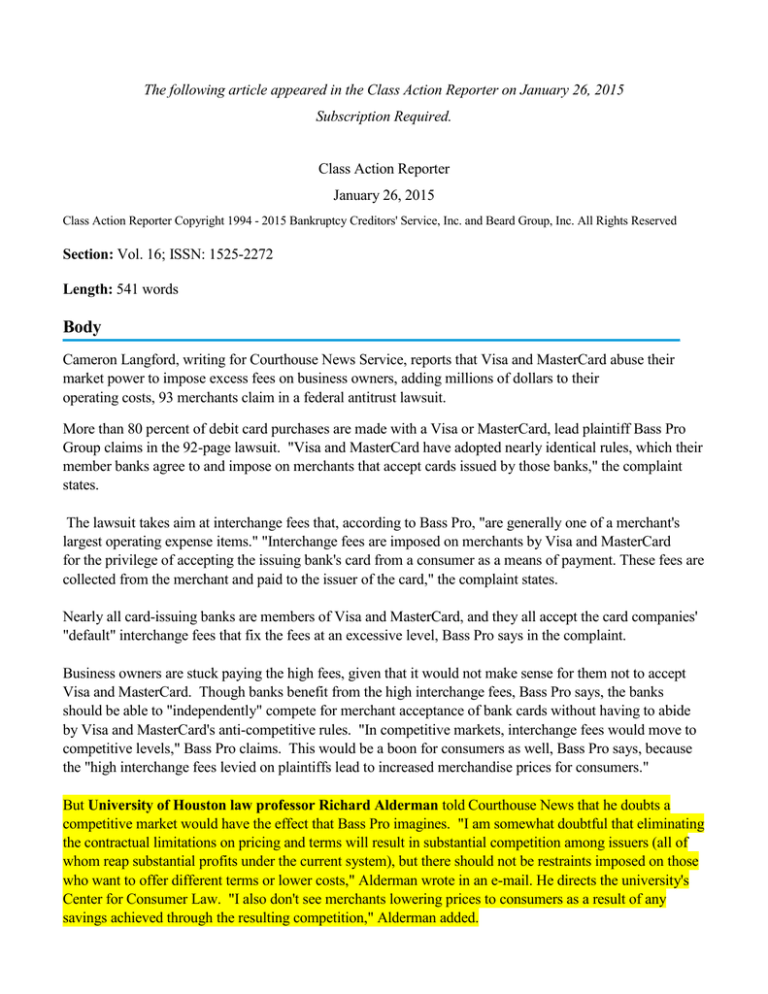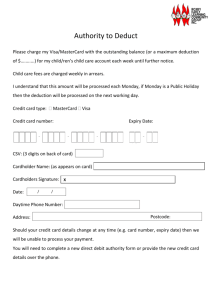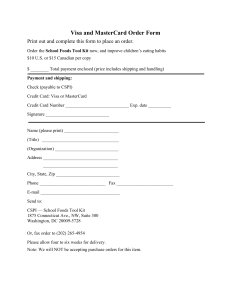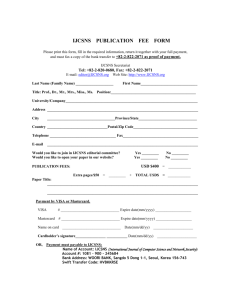
The following article appeared in the Class Action Reporter on January 26, 2015
Subscription Required.
Class Action Reporter
January 26, 2015
Class Action Reporter Copyright 1994 - 2015 Bankruptcy Creditors' Service, Inc. and Beard Group, Inc. All Rights Reserved
Section: Vol. 16; ISSN: 1525-2272
Length: 541 words
Body
Cameron Langford, writing for Courthouse News Service, reports that Visa and MasterCard abuse their
market power to impose excess fees on business owners, adding millions of dollars to their
operating costs, 93 merchants claim in a federal antitrust lawsuit.
More than 80 percent of debit card purchases are made with a Visa or MasterCard, lead plaintiff Bass Pro
Group claims in the 92-page lawsuit. "Visa and MasterCard have adopted nearly identical rules, which their
member banks agree to and impose on merchants that accept cards issued by those banks," the complaint
states.
The lawsuit takes aim at interchange fees that, according to Bass Pro, "are generally one of a merchant's
largest operating expense items." "Interchange fees are imposed on merchants by Visa and MasterCard
for the privilege of accepting the issuing bank's card from a consumer as a means of payment. These fees are
collected from the merchant and paid to the issuer of the card," the complaint states.
Nearly all card-issuing banks are members of Visa and MasterCard, and they all accept the card companies'
"default" interchange fees that fix the fees at an excessive level, Bass Pro says in the complaint.
Business owners are stuck paying the high fees, given that it would not make sense for them not to accept
Visa and MasterCard. Though banks benefit from the high interchange fees, Bass Pro says, the banks
should be able to "independently" compete for merchant acceptance of bank cards without having to abide
by Visa and MasterCard's anti-competitive rules. "In competitive markets, interchange fees would move to
competitive levels," Bass Pro claims. This would be a boon for consumers as well, Bass Pro says, because
the "high interchange fees levied on plaintiffs lead to increased merchandise prices for consumers."
But University of Houston law professor Richard Alderman told Courthouse News that he doubts a
competitive market would have the effect that Bass Pro imagines. "I am somewhat doubtful that eliminating
the contractual limitations on pricing and terms will result in substantial competition among issuers (all of
whom reap substantial profits under the current system), but there should not be restraints imposed on those
who want to offer different terms or lower costs," Alderman wrote in an e-mail. He directs the university's
Center for Consumer Law. "I also don't see merchants lowering prices to consumers as a result of any
savings achieved through the resulting competition," Alderman added.
The merchants seek class certification and treble damages for Sherman Act violations and for their losses
from the interchange fees.
Plaintiffs are a motley band of businesses, including Ross Dress For Less, 1-800-CONTACTS, Joe's Crab
Shack, Love's Travel Stops & Country Stores and Scandinavian Airlines of North America. Professor
Alderman noted that the lawsuit was filed in East Texas, which is known as a plaintiff-friendly jurisdiction.
Neither Visa nor MasterCard responded to a request for comment.
The Plaintiffs are represented by:
Richard E. Norman, Esq.
CROWLEY NORMAN LLP
Three Riverway, Suite 1775
Houston, TX 77056
Telephone: (713) 651-1771
Facsimile: (713) 651-1775
E-mail: rnorman@crowleynorman.com
Load Date: 2015-01-26



